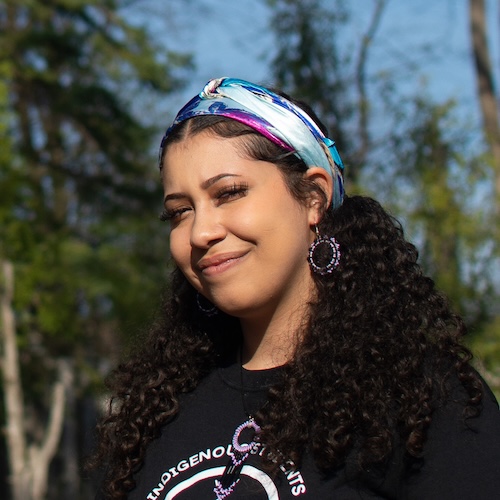The National Day for Truth and Reconciliation, observed each September 30, is a national response to the Truth and Reconciliation Commission of Canada (TRC). This federal holiday honours the children who never returned home from residential schools and the Survivors, families and communities who live with that legacy. It coincides with Orange Shirt Day, inspired by Phyllis Webstad’s story, which symbolizes the loss of culture, freedom and dignity experienced by Indigenous children.
The day invites public remembrance and learning about the impacts of residential schools and the history of colonial policies. But reconciliation is more than remembrance. It calls for an ongoing commitment to truth, education and action with Indigenous Peoples. This post introduces the TRC, shares my experience as an Afro-Indigenous student and offers ways to reconcile at York with recommended Indigenous-authored resources!
What is the TRC?
The TRC was created through the 2007 Indian Residential Schools Settlement Agreement and operated from 2008 to 2015. Its mandate was to hear the stories of Survivors and document the history and legacy of the residential school system; the institutions that removed Indigenous children from their families and suppressed languages, cultures and governance systems.
The TRC Final Report and 94 Calls to Action invites all people in Canada to join a process of repair and transformation. Calls to Action 62 and 65 speak directly to education and reconciliation in post-secondary spaces.
At York, the 94 Calls to Action guides ongoing work such as the Indigenous Framework, which centers Indigenous knowledge and hosts events like Orange Shirt Day and the National Day for Truth and Reconciliation. A review of York’s Indigenous Framework was completed in 2024.
What TRC means to me
As an Afro-Indigenous student of Mohawk and Mi’kmaq heritage, I carry the intergenerational impacts of colonialism in both Black and Indigenous histories. The TRC’s Calls to Action shape how I approach community work and advocacy at York University and across Turtle Island.
For me, reconciliation means honouring Indigenous and Black histories of survival and contributing to a future built on justice and mutual respect. It is both personal and collective.
At York I have served as student success mentor - Indigenous focus for the Centre for Indigenous Student Services (CISS) and academic peer support assistant – Indigenous focus in collaboration for Learning Skill Services and CISS. These roles let me support Indigenous students academically and socially while weaving cultural teachings into campus life.
Through other positions, including with the York Federation of Students and as President of the Indigenous Students’ Association at York, I have advocated for Indigenous student rights and helped organize Orange Shirt Day programming that builds peer support and cultural celebration.
I extend these commitments into curriculum development by partnering with the Canadian Federation of Students on national policy and supporting faculty projects that embed Indigenous perspectives in course materials. Beyond York, I work full-time as a team assistant for Camp and Holistic Services at Native Child and Family Services of Toronto, supporting programs that nurture Indigenous youth and families in an urban setting.
These experiences affirm that reconciliation is not only a national project but a daily practice of healing through community action, education and relationship building between Indigenous and non-Indigenous peoples.
ReconciliACTION!
Reconciliation lives in what we choose to do next. Here are a few ways to take action on campus and in your community:
- Attend York’s Orange Shirt Day and related events to honour Survivors and raise awareness of residential school legacies.
- Learn local land histories and build respectful relationships with Indigenous nations whose territories we live and work on.
Small, consistent steps create lasting change!
Recommended readings and resources
The TRC is not an event but an ongoing journey of understanding and action. These Indigenous-authored books and resources offer guidance and are all available through York’s libraries and website!
52 Ways to Reconcile: How to Walk with Indigenous Peoples on the Path to Healing: A year-long guide with weekly actions that turn intention into practice and build habits of awareness, relationship and accountability.
Becoming Kin: An Indigenous Call to Unforgetting the Past and Reimagining Our Future: Patty Krawec urges readers to recover what colonialism silenced and to see reconciliation as relational and spiritual, not only legal or institutional.
Indigenous Wellness: How Culture and Communities Empower Me: This episode of the Well-being and YU podcast looks at well-being through an Indigenous perspective to focus on community, advocacy and reclaiming joy.
Re-Storying Education: Decolonizing Your Practice Using a Critical Lens: Carolyn Roberts shows how colonial narratives shape schooling and offers strategies to decolonize lessons and assessments.
Unreconciled: Family, Truth, and Indigenous Resistance: Jesse Wente blends memoir and critique to explore family history, truth-telling and resistance to colonial structures.
Wayi Wah! Indigenous Pedagogies: An Act for Reconciliation and Anti-Racist Education: Jo Chrona provides a framework for embedding First Peoples Principles of Learning and dismantling systemic racism in schools.
Reconciliation is a continuous practice of learning and action. By engaging with these readings, joining York’s Indigenous-led events and carrying these lessons into classrooms and communities we can all help turn truth into meaningful change.
